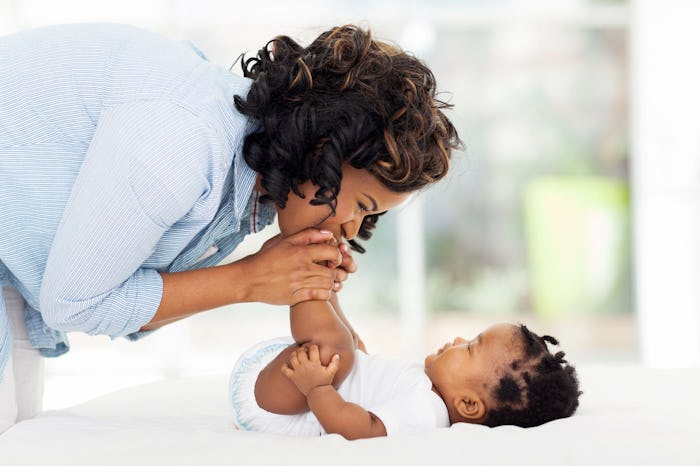Life

Does Baby Talk Delay Speech?
I don't know about you, but whenever I see a baby, I tend to respond the same way as when I spot a puppy — I gush, coo, and say "what a sweet baby" in a sickeningly sweet voice. Although that seems to be a completely natural and understandable response to babies, you have to wonder if that's best for baby. Specifically, does baby talk delay speech?
It seems more common to find parents who downright refuse to speak "baby talk" to their babies, due to a concern that it might end up "hurting" their baby later in the form of speech problems or a delay in language development. Although PBS Parents noted that there is some evidence that baby talk is bad, "parentese" — a sort of relative of baby talk — can be useful in helping your baby's speech develop.
So first things first, what in the world is "parentese," and how is it different from baby talk? Glad you asked. According to the aforementioned PBS Parents article, parentese uses real words where as baby talk is based on sounds and made-up words that don't really mean much of anything. Beyond simply using existing words, parentese is characterized by elongated vowel sounds, according to Today's Parent. So that "what a sweet bay-bee" that I mentioned is my knee-jerk reaction to puppies and babies alike is actually A-OK.
And, according to past studies, the exaggerated sounds, melodious nature, and repetition that make up parentese allow infants to begin to analyze speech pathways. The studies have found that by 20 weeks many infants can make vowel sounds "ee," "ah," and "uu." Additionally, researchers at the University of Washington and the University of Connecticut found that the tone and context of speech is more important than what you're saying to your baby. The study concluded that children who hear more parentese-style baby talk as infants and babies tend to know more words by the age of two than babies who aren't exposed to parentese.
Let's go back to baby talk, though, for just a minute. Katherine White, professor of developmental psychology at the University of Waterloo in Canada told Today's Parent that there really isn't a ton of research out there on whether or not using made-up words can significantly delay speech. That being said, it means that your baby has to learn two words instead of one — the made-up version and the real word to which it's referring. White also pointed out that babies often make up their own words and names for objects. According to White, those don't necessarily need to be corrected, so long as the child knows the real word - he'll switch over to calling it by it's real name when he's ready to do so.
Dr. Maria Casasola, associate professor of human development at Cornell University found that talking to babies, acting out songs, and reading aloud can all help boost a baby's speech development and language acquisition.
Talk to your babies when they're small - one day soon they'll be able (unfortunately?) to talk back.